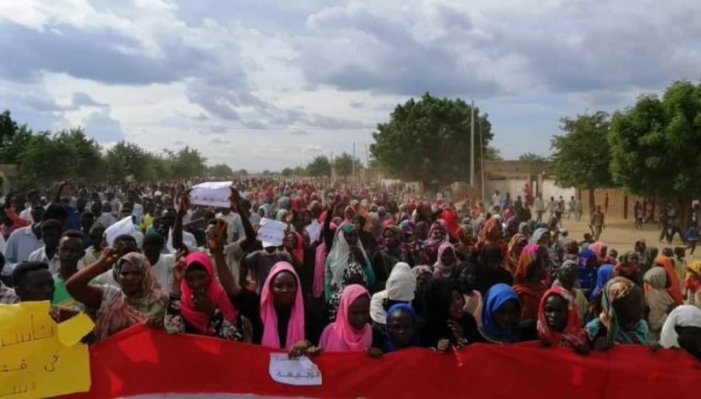A little over a year has passed since the agreement that established Sudan’s current Transitional Government, composed of the army and the leaders of the Alliance for Freedom and Change (ALC). National elections are supposed to be held in 2022. The agreement reflects the expectations of the Sudanese masses, who suffered bloody repression and hundreds of dead and wounded in an all-out struggle. They want a civilian government that responds to the economic and political demands they raised during the 2018 and 2019 revolts that overthrew the 30-year tyranny of Brigadier Omar al-Bashir.
Even though more than a year has passed since the fall of al-Bashir, the pillars of his regime remain in place. Although the ALC-army agreement institutionally diverted a movement reminiscent of the Arab Spring, demonstrations in Sudan have once again flooded the streets. The slowness of the promised political reforms reveals to the Sudanese that their hoped-for “democracy” will not arrive without further struggle.
Although the masses achieved some historic demands, such as the prohibition of female genital mutilation (which is still practiced), many remain unrealized, including the call for justice against those responsible for the murder of hundreds of demonstrators. Also unresolved are the country’s deep structural problems, aggravated by IMF impositions and U.S. sanctions.
In addition, the regime based on Islamic law remains almost intact, so that women continue to be punished with the death penalty for having consensual extramarital sex. Half of the 2019 demonstrators were women.
You might also be interested in: Repression and Resistance in Sudan
Wrapped in Sudanese flags and chanting slogans calling for more reforms, the protesters have been on the streets since August 17, the first anniversary of the transitional agreement. The protests are taking place at the transitional government’s headquarters in the capital, Khartoum. They demand, among other things, the election of a legislative body and the dissolution of the regular and irregular armed forces (there are still paramilitary bodies operating in the country). Moreover, they want all companies to be under the control of the Ministry of Finance, the prompt holding of an economic conference, and the restructuring of the ALC.
The demonstrations were repressed with tear gas, sticks, and rubber bullets, leaving dozens of people injured and detained. Before this, the Sudanese Professional Association (SPA), an organization that groups unions and parties of the Left and liberals, warned that the repressive forces’ provocations could lead the protests to escalate. The Coordination of Committees of Resistance, a group that describes itself as “pillars and protectors of the revolution,” is discussing next steps.
State banking workers in Khartoum planned to go on strike on Tuesday to demand a reform in the banking system due to corruption.
Meanwhile, thousands of inhabitants of the country’s southern regions have been protesting for a month for better infrastructure, basic services like water and electricity, and the removal of all the officials linked to the old regime. They also demanded better hospitals, which lack water, electricity, and medical personnel.
In addition, there are tribal conflicts in the country that have been deepened by the racist attacks, incited by al-Bashir against the Black population by Arab Muslims (Sudan has a large Arab-Muslim majority). The government has used ethno-religious rifts to hoard natural resources and impose social control. Among the demands of the Resistance Committees is the acceleration of peace talks in regions where the parastatal Janjaweed militias, armed by the former regime, continue to carry out bloody killings against the Masalit population.
The Resistance Committees were born more than 10 years ago, but they played a prominent role in the movement that ousted al-Bashir. They deeply distrust the military wing of the government that maintains its own agenda, even though it is endorsed by the civilian wing. An example of this is the advance toward peace with Israel by following the United Arab Emirates, faithful allies of the Sudanese Armed Forces. The civilian wing, represented by the ALC, in addition to supporting the military wing by omission, did not solve any of the country’s structural problems, while 10 million people face food shortages and the accelerated increase in food prices, which is worsened by the restrictions imposed by Covid-19, while a contraction of 8.1 percent of GDP is expected for this year, according to the Economist. The government is establishing new ties with imperialism (on Tuesday Secretary of State Mike Pompeo will visit Sudan) and has a plan for the UN to intervene to develop the economy.
The self-organized activists of the Resistance Committees, in which the SPA workers participate, are demanding that the ALC return to the “principles of the revolution” by holding Prime Minister Abdallah Hamdok up to the line, who said on August 22 that he would be willing to resign from office if the Sudanese people ask him to. But for this to happen, the movement must impose an agenda of its own, one that breaks with the FTA. The armed forces will also need to be dismantled — as the movement is demanding — as will any relations with U.S. imperialism and its regional partners Israel, Saudi Arabia, and the UAE. These new protests are giving a renewed impetus to Sudan’s class struggle, showing that the 2019 movement is still underway.
First published in Spanish on August 25 in La Izquierda Diario.











